We made a point – it meant a long day in a poda-poda, past checkpoints and short interviews with the police – of going to Koidu. Sierra Leone is rich in diamonds and Koidu is a mining town at the centre of the terrible blood diamond conflict. During the civil war of 1991-2002, the RUF (rebels, or Revolutionary United Front) held Koidu at times, forcibly putting civilians to work in the mines. Warring factions and the UN fought for control of the diamond fields, fuelling the violence and the desperate search for precious stones.
Today Koidu is filled with diamond offices, diamond traders and buyers.
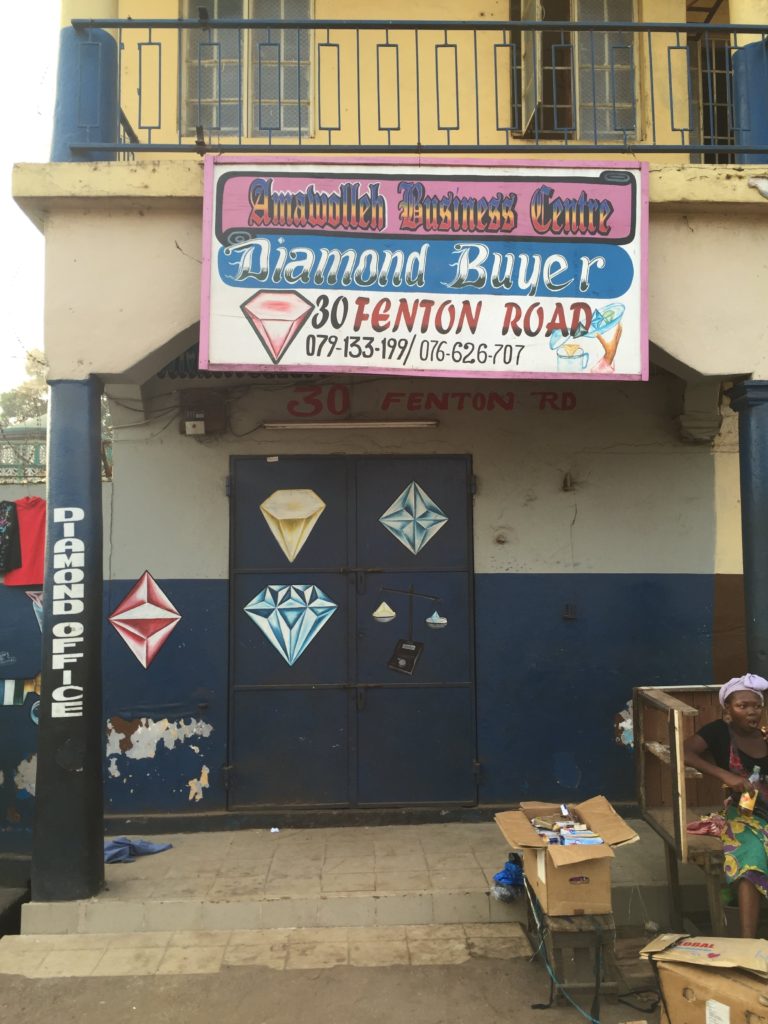
Anybody can dig for diamonds – and that’s just what many people do, to the detriment of their farms. We wanted to see some diamond miners in action so we walked out to the bridge and looked down the river. Sure enough, we spotted some guys with the tell-tale big round sieves and shovels, so we scrambled down the bank. Picking our way through the mud and long grass, we went over to say hello.

They had not found any diamonds that day – most artisanal miners rarely do. It’s illegal to bring diamonds out of the country (much to Oyv’s relief), so although a miner with shifty bloodshot eyes offered to hook us up, we went back to town without any expensive souvenirs.
The war is in the past now, and at first glance Sierra Leone looks alright. Yes, the people are visibly poor, but they generally have roofs over their heads, they have food, they seem to get by on a day-to-day basis. But in talking to the NGO workers we’ve met, we hear the same story again and again. There is no working sanitation system, no properly functioning public healthcare or education. Literacy rates and life expectancy are low; infant mortality is high. There is actually almost no electricity; only some parts of Freetown sometimes have power and everyone else relies on private generators or makes do without. This beautiful, friendly little nation languishes at the bottom of the list of the 10 least developed countries in the world.
As seems to so often be the case with African countries, whenever things are looking up another disaster strikes. Sierra Leone was still struggling to get back on its feet after the devastating 11 year long civil war when Ebola broke out. Although the country has officially been ‘Ebola-free’ as of November 2015, we still see reminders of the deadly epidemic everywhere. Faded notices in every public space remind citizens that ‘Ebola Stops With You’; or attempt to discourage the lingering ‘Ebola Survivor Stigma’; admonish us to always wash our hands; and most ominously, instruct that ‘If your relative dies at home, pray and pay your respects at least 1 metre away from the body, and call the burial team’. At our hotel in Bo this list of Ebola-avoidance tips was posted beside the door to our room:

But everyone knows that tourism generates income, and in the face of seemingly insurmountable problems many people are striving to bring out the best this country has to offer. And there is so much to discover in Sierra Leone.
We moved on to Tiwai Island, a little eco-reserve in the Moa river. Our first hint that there is yet some work to be done came when the guide bringing us across the river slurped up the last of his Amaretto (street vendors sell all sorts of alcohol in little foil packets for enjoyment on the go) and threw the empty packet overboard, straight into the water.

Tiwai is a co-operative effort with the best of intentions: Sierra Leone’s non-existent tourists are meant to stay in a community-run camp and go on guided nature walks.

This meant convincing the people living in the surrounding villages that nature conservation and the tourism to follow would benefit everyone and bring in as much money as poaching chimpanzees, diamond-mining and destructive farming practices. It’s working, and the locals run a rudimentary camp, maintain the hiking trails in the forest and knowledgeable guides are available for early morning walks. Ours snuck stealthily ahead through groves of gigantic bamboo, signaling us to hush and pointing out red and black colobus monkeys, Diana monkeys and countless species of birds all around.

Like any other tourist attraction in this country Tiwai is just not quite ready yet: it’s hard to get to, impossible to reach the staff in advance, and the camp is both disorganised and costs a lot more than it should. However, in terms of having a quiet forest to yourself and a hammock swinging by the river, it’s hard to beat.
Getting away from Tiwai turned out to be easier than we expected: we caught a ride from the village with an English expat who visits the camp sometimes for research.

Foreigners driving around jungle roads ‘upcountry’ in a land cruiser is not a regular sight and the people in every village we drove through turned out to wave.
As we travel from place to place, we’ve noticed no shortage of churches and mosques, and a lot of evangelising on billboards with invitations to church groups or sessions with famous visiting miracle workers, along with reminders that doom is approaching:

The proprietor at one guesthouse we stayed at was not shy about posting his rules:

Every poda-poda in the country is emblazoned with one slogan or another, mostly religious:
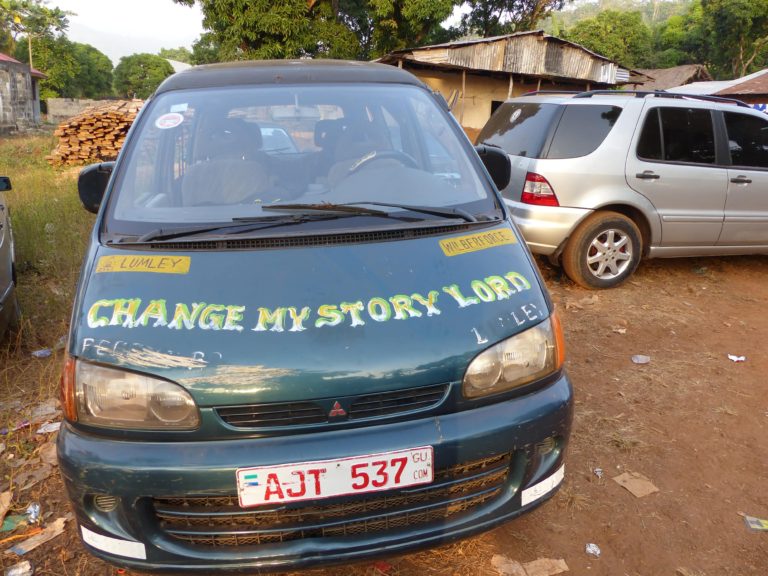
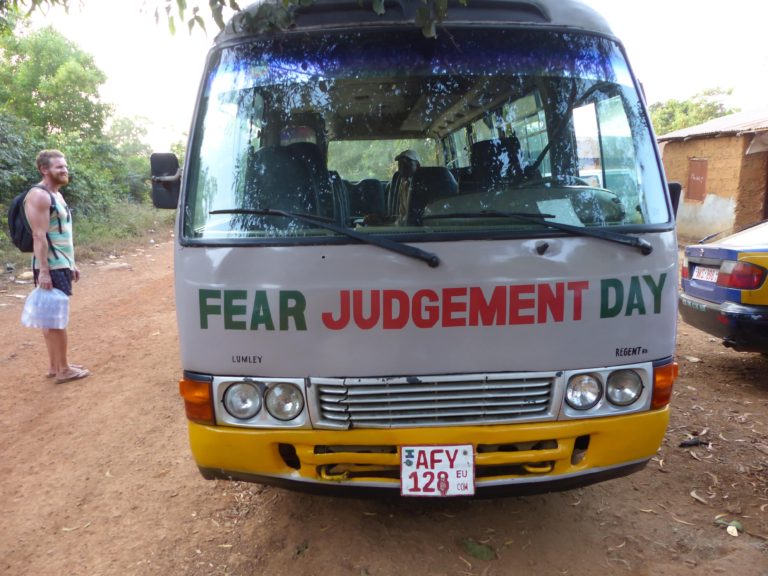
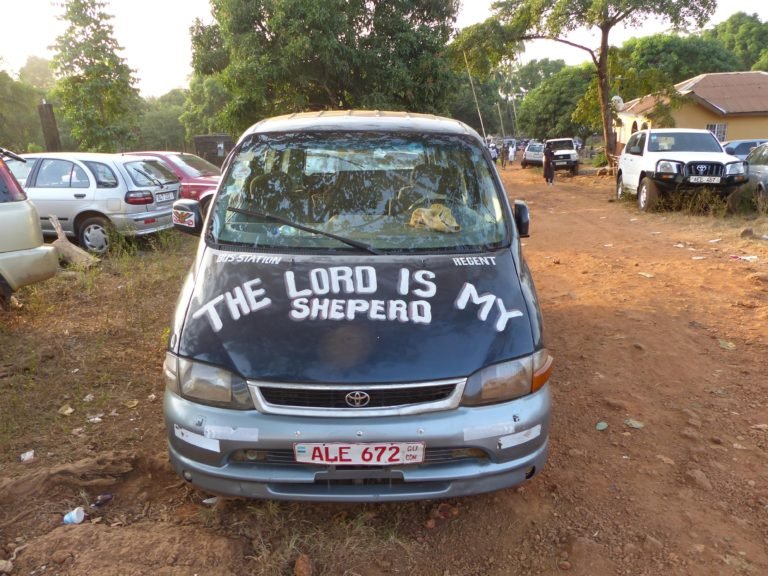
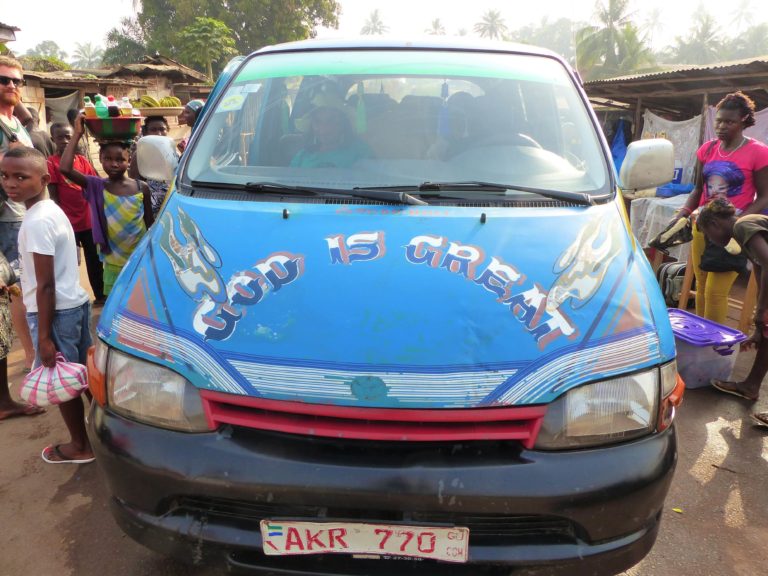
Some other favourites I didn’t manage to snap include ‘God Bless my Boss’, ‘God is One’, ‘I Hope to Allah’ and, the ironclad excuse absolving reckless drivers and inept conductors of all responsibility, the one that makes the heart of every weary traveller sink into their shoes: ‘God’s Time is Best’.
By New Year’s we’d made it to Bureh Beach. The Freetown peninsula is famous for its staggeringly beautiful beaches, and the rumours are not exaggerated. At Bureh, a clutch of houses and some shops back a long empty expanse of golden sand that seems to stretch on forever.


It’s wonderful.


The major downside to Bureh (and many other places) is corruption: the local chief collects an entry fee from every person who comes to visit. None of this money ends up where it should, re-invested in the community: instead, it goes into the chief’s pockets.
There are just a few basic guesthouse operations, mainly catering to the NGO crowd from Freetown. We got ourselves a tent on the beach and celebrated the arrival of 2017 with the expats around a bonfire on the beach.


We felt a bit rough on New Year’s Day, but what a place to recover!

A few days later, still unable to tear ourselves a way, we moved into a hut and stuck around a bit longer.

We ate simple meals of grilled fish and plantains, and wandered every day for kilometers up the beach.
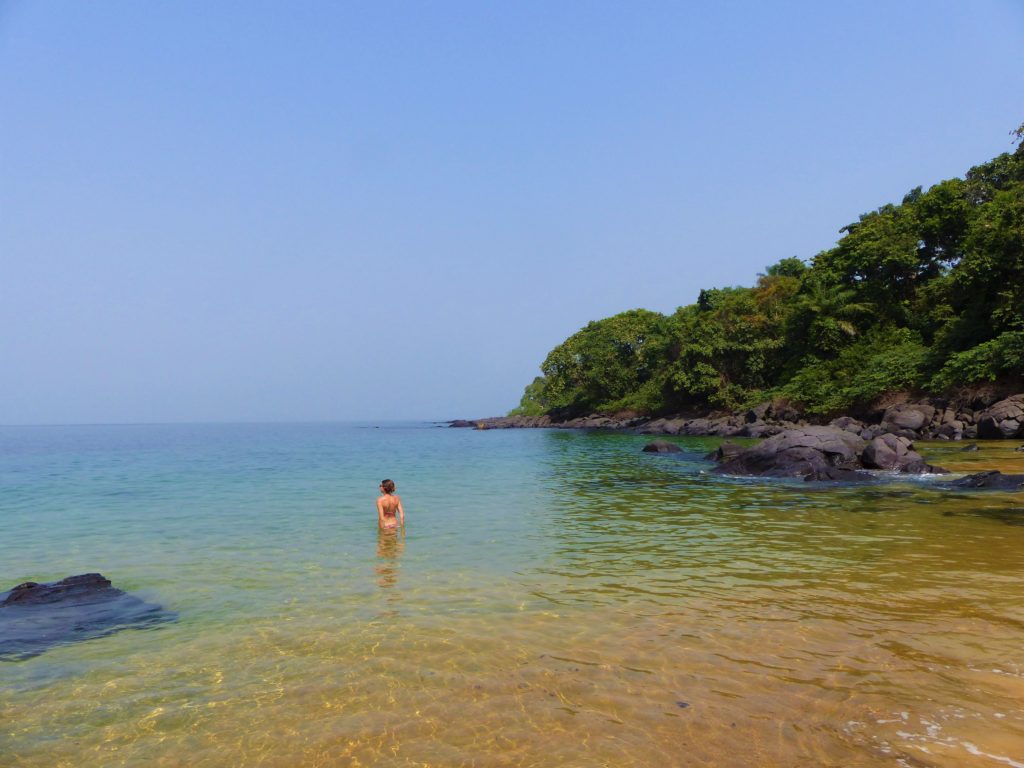
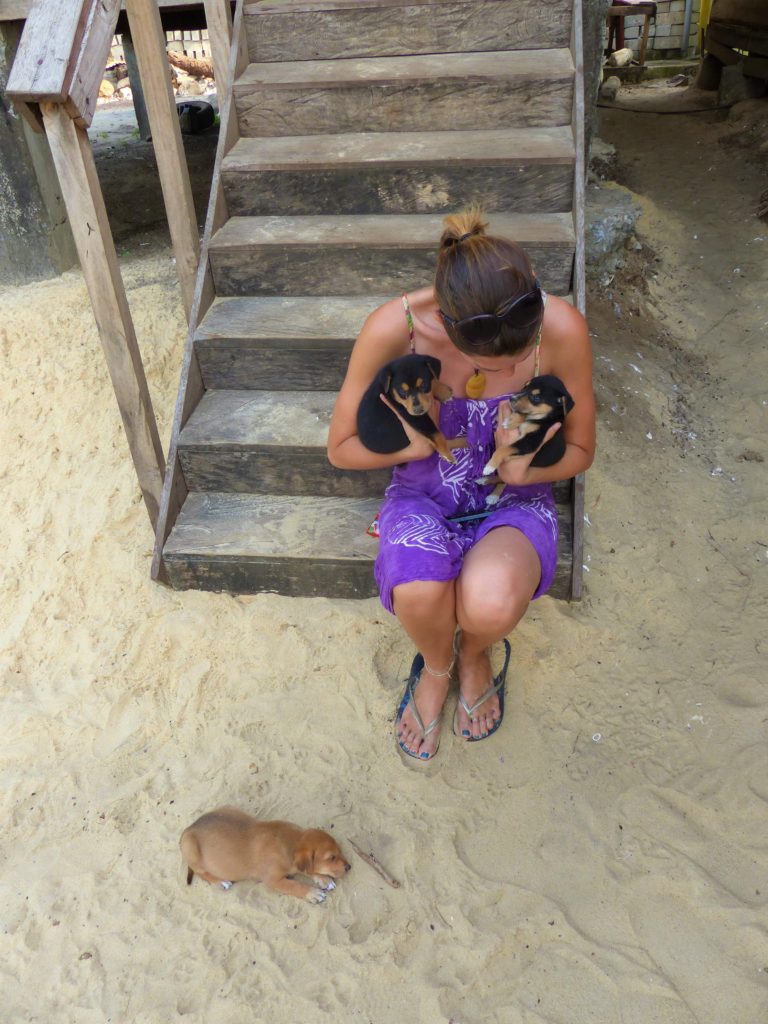
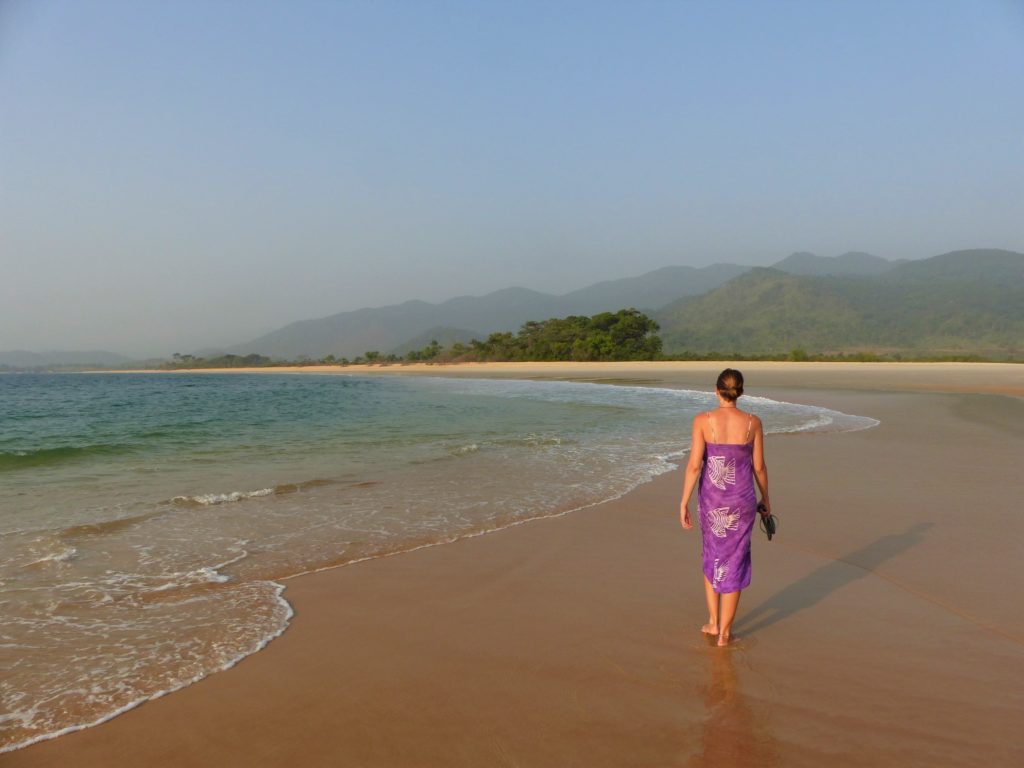
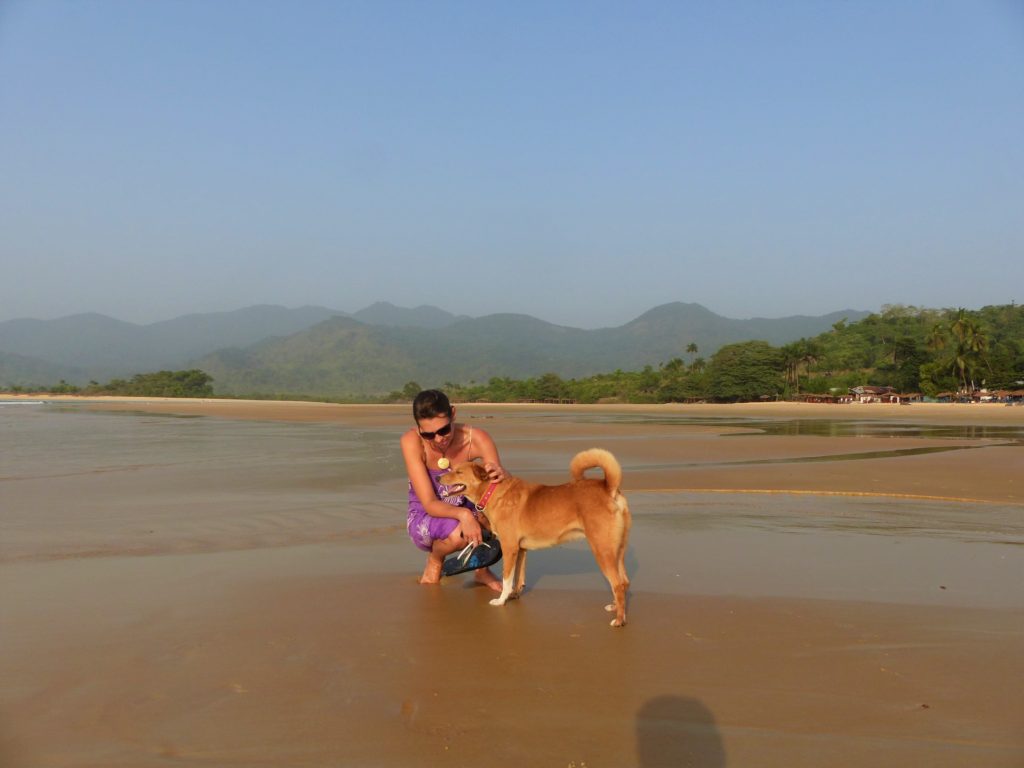
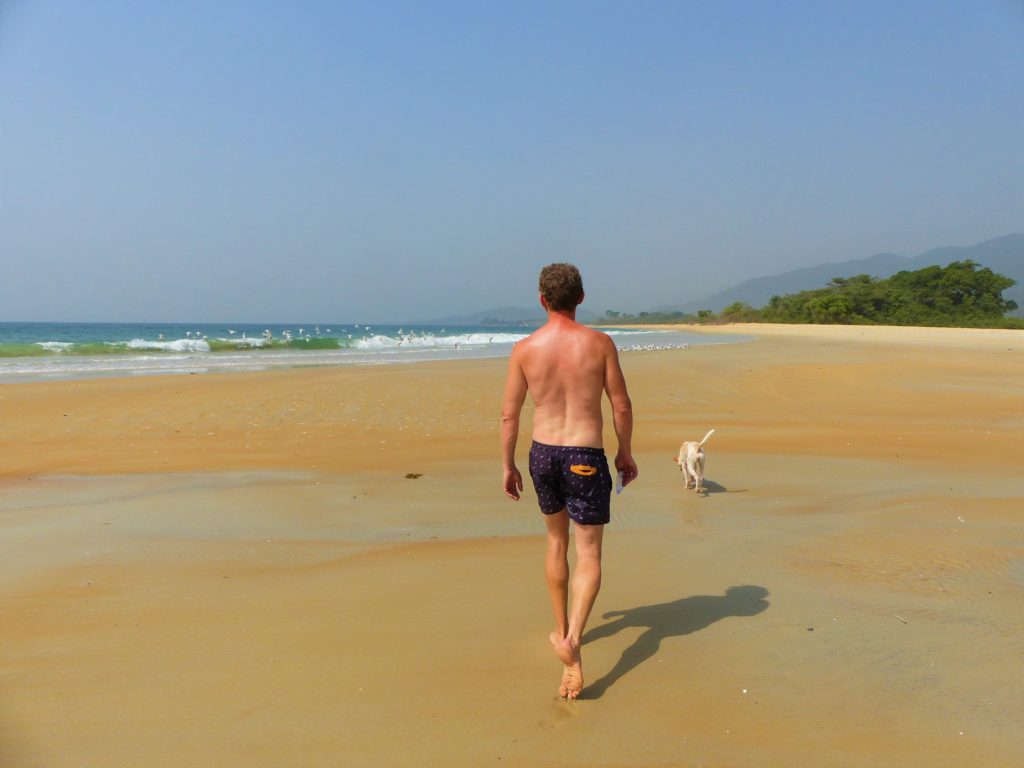
One day we visited Tacaguama Chimpanzee Sanctuary, which aims to reintegrate chimps captured for pets or orphaned in the bush meat trade, back into the wild.
Tacaguama was big news in 2006 when 31 enterprising chimps wedged open the door to their enclosure and orchestrated a breakout. They ran amok in the forest, attacked two visitors and killed a taxi driver before they were rounded up. Bruno, the mastermind behind the breakout, and two of his accomplices remain at large to this day.
Eventually we made our way from ‘upcountry’ – that is, basically anywhere outside of the peninsula – to a horrible, frenetic, sweltering, suburb called Waterloo, and on to Freetown itself.
Sierra Leone’s links to Britain are especially visible in the names of towns and villages (which bear little resemblance to their namesakes): Waterloo, Regent, Kent, Gloucester, York and Aberdeen, to name just a few.
English is the official language in Sierra Leone although its regular use is mainly limited to the capital. We’ve noticed English speakers often use quaint and rather formal phrases, such as wishing us ‘Many happy returns’ and offering ‘Compliments of the season’, as we’re here at Christmas. There are also around 23 local languages including Krio, the lingua-franca that unites us all – it’s partially understandable even to a visitor. And then there’s this less quaint and formal notice we see scrawled on walls everywhere:

In 1787, British philanthropists founded a ‘Province of Freedom’ on the site of present-day Freetown as a homeland for liberated slaves. Many American slaves were granted their freedom in return for fighting for England in the War of Independence. But they ended up impoverished on the streets of London while others were resettled (miserably) in Nova Scotia. The new province’s first settlers regularly encountered disaster – they were unprepared for the hostile climate and met with resistance by local tribes already living there. Although Britain abolished the slave trade in 1807 it continued to thrive, helped along by chiefs who sold their own people. The British navy began intercepting and releasing slave cargoes setting sail from other parts of Africa. These ‘recaptive’ Africans were sent to Freetown, regardless of where they’d come from in the first place. Although originally intended for self-governed independence, the floundering settlement was taken on as a Crown Colony by Britain in 1808.
At the start of this trip back in Senegal, we saw a stone gateway at a slaving fortress on Ile de Goree; it symbolised the last glimpse of home for many captive Africans.
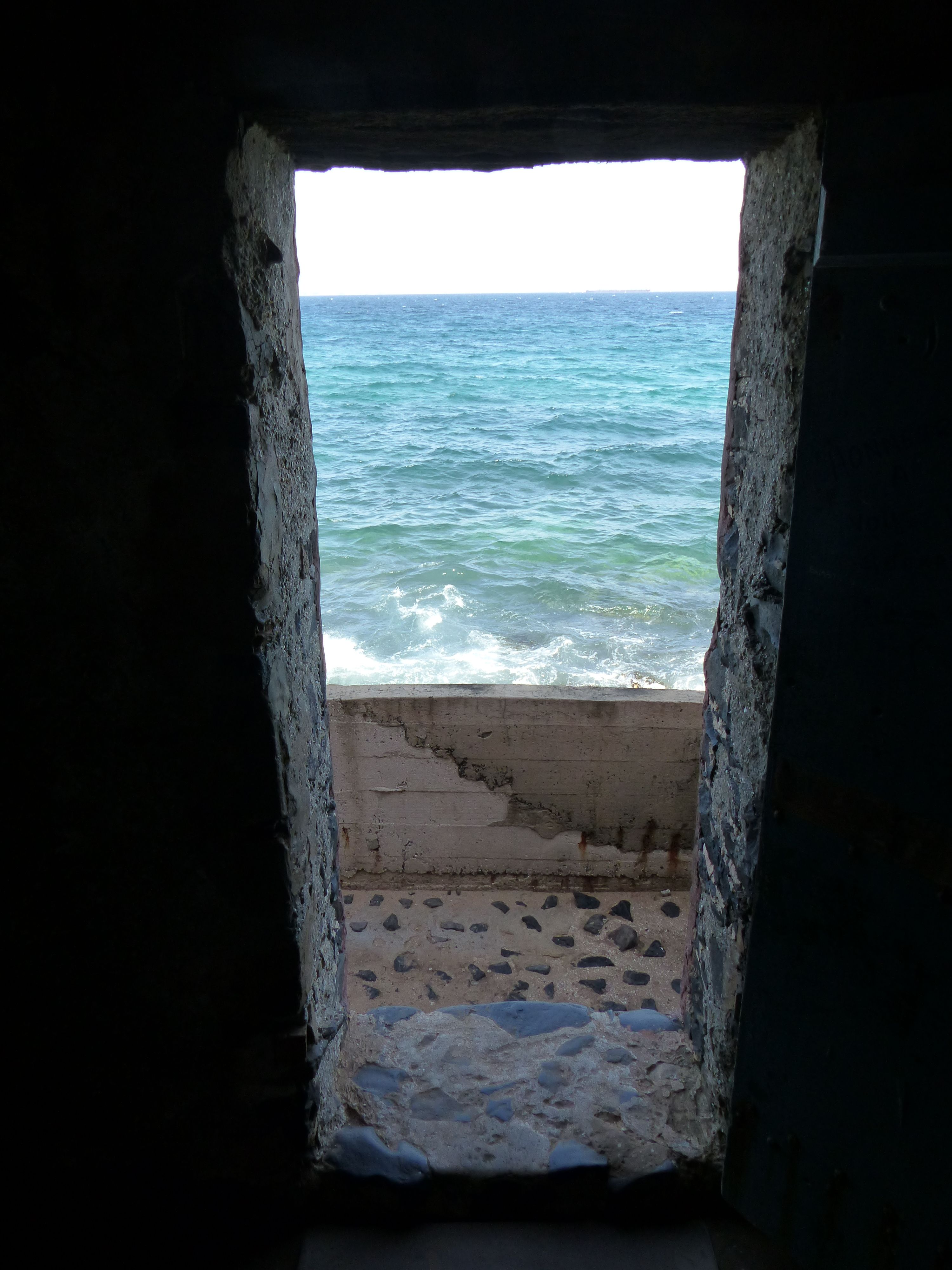
So it was only fitting that here at the end of our trip in Freetown, we visited the Old Wharf Steps. To us, they are just a worn down flight of stairs, but they have a powerful significance. Leading up from the port and into the city, these steps were the first that most newly liberated slaves took on African soil.

A huge cotton tree stands at a roundabout in the centre of Freetown. It’s a famous landmark: it was here that the first settlers cleared land and hacked roads out of the jungle, and the city began.

Despite all of its problems – Sierra Leone is an amazing place to visit, with so much fascinating history and potential for beauty and peace. But for now and maybe forever, it’s definitely a diamond in the rough.
Read More
For more of our adventures (and misadventures) in Sierra Leone, check out the rest of my stories from the road.
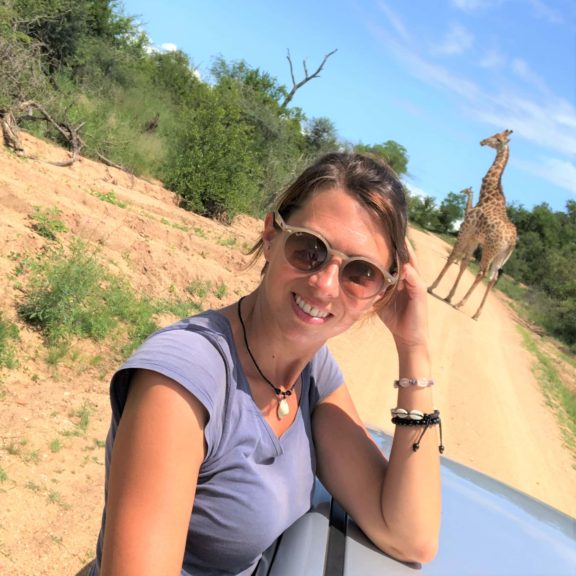
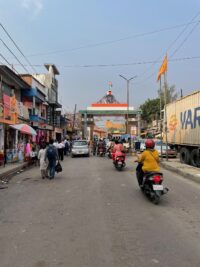
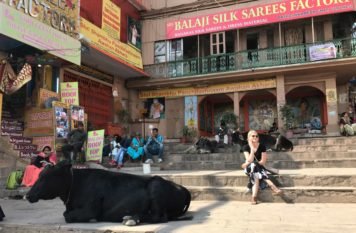
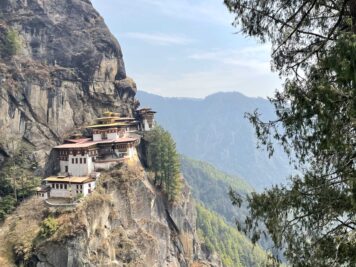
This Post Has 2 Comments
Lovely travel blog. Did you guys ever travel to Liberia and Cote D’Ivoire?
Thanks! And yes, we just recently did a trip where we started in Liberia and traveled to Cote d’Ivoire – I wrote about it, it’s here on the blog:)